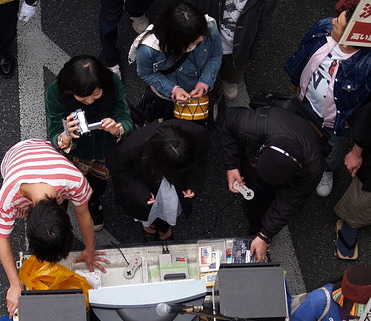
The Japan Times, an English-language newspaper, reports today that the Japanese government is backpedaling on its plans to ban the sale of used electronics. (Thanks to velocipede for the tip, in comments on our previous story.) It sounds as though musical instruments were at the heart of the controversy, as Ryuichi Sakamoto argued for vintage synth liberation. Outraged resellers and electronics lovers took to the streets to protest the ban, as shown here . . . playing Famicom. (Which, oddly enough, proves to be at least as fun as burning down KFCs.) More after the jump now that we have some solid details . . .
The article explains a number of interesting points:
And talk about backpedaling: government officials say they won’t enforce the ban at all, on anything used, April 1, at least delaying enforcement. “Vintage” items are now officially off the table, though apparently not much has changed there — no one is sure what’s exempt. And while the Japanese government delays the ban, resellers continue to seek an exception for all secondhand items. (PSE certification stickers, therefore, would be required on all new items.)
So there you have it: some last niggling on figuring out what that exception has, vintage Japanese music devices and Famicoms alike are safe, certainly on April 1, and most likely well after that, too. Your local Shibuya used fridge dealer may still have some arguing to do, but it sounds like reason may have actually won out.